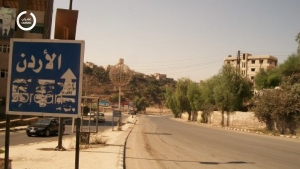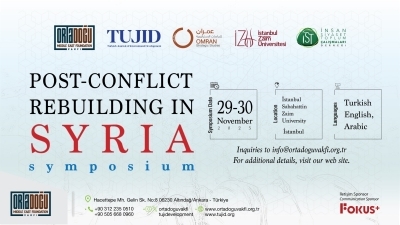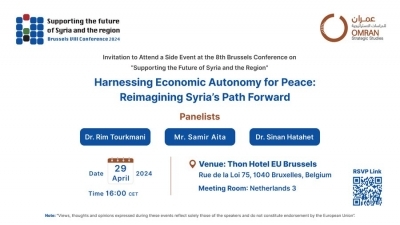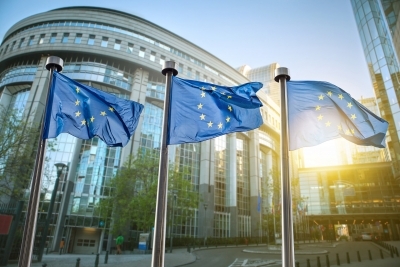Articles
From Settlement to Captagon: The Security Dynamics in Syria’s Daraa
The Captagon problem has been one of the most critical security dilemmas for Jordan, due to the increasing attempts of drug and weapon trafficking into its borders that became a threat to Jordan’s national security according to a formal assessment paper, along with the ineffectiveness of the current mechanisms to deter the actors involved in Captagon, particularly Iran-backed militias and the Syrian regime. Although the 2017 de-escalation agreement is supposed to grant Iran-backed militias being pushed back 40 km from the Jordanian border, Russia has not completely fulfilled its pledges. The Russian-sponsored settlements of 2018 and 2021 have failed to introduce a security-providing environment through the DDR process of opposition armed groups in Syria’s Daraa.
The security dynamics of the settlements have played a crucial role in creating a Captagon-friendly environment i.e. the absence of a hegemon actor with the involvement of Russia, Iran, and the regime, in addition to former opposition groups which underwent a transformation process in terms of their motivations (political or economic) and objectives of the use of force (zero-sum or variable-sum). Many of the armed groups that had fought fiercely against the Syrian regime gave up on their political aspiration and became involved in Captagon trafficking. This article provides insight into the security landscape, particularly the interconnection between security and Captagon, as a war economy dynamic, in Syria’s Daraa, and ultimately proposes alternative policy scenarios.
The Status Quo of the Settlements
The settlements of 2018 and 2021 between the Syrian regime and opposition factions under Russian auspices resulted, mainly, in the piecemeal return of the regime’s security apparatuses to the governorate, and the integration of many opposition fighters into these apparatuses, without achieving concrete progress vis-a-vis the detainees or forcibly-disappeared persons in regime’s prisons. Since the first settlement, Daraa has been characterized by a fragile security with the prevailing wide scale, politically motivated to a large extent, violence against various civil and armed individuals, let them be affiliated with the opposition or the regime.
Assassinations and detentions, at which dozens of individuals are targeted monthly, have been the regime’s tools to eliminate his opponents relying, for the most part, on the Military Intelligence Branch of Daraa/Swayda, led by “Loay al-Ali”– an EU, UK, and Canada sanctioned Brigadier-General who was promoted to his current position before the 2018 settlement after he served head of the military intelligence/Daraa section between 2011 and 2018.
Thus, the regime rested on a variable-sum use of force to strengthen its territorial control, eliminate opponents, benefit economically from Captagon trafficking, and underpin its central role in the settlement status quo. Yet, even the transformation of regime behavior from zero-sum to variable-sum is mainly a result of Russian diplomatic coercion and the externally imposed status quo in Syria i.e. the relatively frozen conflict that started to arise in 2018.
The Transformation of the Opposition Armed Groups
Former opposition armed groups in Daraa have pursued different survival strategies to cope with or counter-balance the increasing security leverage of the regime in the governorate. Their transformations have generated different types of armed groups with varying motivations and objectives. While the 8th brigade became mainly motivated by preserving the settlement’s status quo that granted the brigade territorial control over some localities and a maneuvering ability to expand influence; other groups, many of which became associated with the regime, have relinquished their political motivations for economic ones through getting involved in Captagon trafficking and/or thuggery activities.
The 8th brigade led by the former opposition commander, Ahmed al-Oda, and composed mainly of former opposition fighters of “Sunna Youth Forces,” has maintained its territorial control in Eastern Daraa’s Busra al-Sham since its establishment under Russian auspices in the aftermath of the first settlement in 2018. Given the relatively secure environment with the lowest assassination rate and the better governance services in areas under its control in comparison with other areas in Daraa, the brigade has managed to preserve social support and counterbalance the regime’s influence seeking to preserve the settlement status quo. Yet, the brigade increased its leverage through variable-sum use of force.
The 8th brigade conducted multiple security operations against ISIS or groups accused of ISIS affiliation in different parts of Daraa such as Jasim in Western Daraa in August 2022 and Daraa al-Balad neighborhood where the operation eliminated the Hafo-Harfoush militia in December 2022. These operations were conducted after the regime’s escalation and threats to launch offensives in these areas under the pretext of ISIS cells, in which the 8th brigade capitalized on the social rejection of the regime’s interference and its connections with local Sheikhs and dignitaries. In addition to its previous intermediary role between the regime and local communities to ease escalation such as the cases of the 2022 March escalation in Jasim and the 2020 February escalation in al-Sanamayn city Northwestern Daraa. Moreover, the 8th brigade has also targeted other groups involved in Captagon trafficking in Northeastern Daraa including a group affiliated with Fayez al-Radi, a former opposition commander assassinated after an escalation with the 8th brigade.
Other groups such as those led by Mustafa al-Masalmeh and Imad Abu Zureiq, the two former opposition commanders, have not only given up their political struggle against the regime after the settlement but also became affiliated with the regime, as they became motivated by economic motives under the new status quo, where the regime became superior. As such, they have been involved in trafficking Captagon drugs, imposing levies on locals, and conducting assassinations against regime opponents on behalf of the military intelligence – which is managing militias and receiving levies from them.
By April 2023, both Abu Zureiq and al-Masalmeh were sanctioned, along with Assad family-affiliated individuals including his cousins, by the U.S., EU, and UK for their involvement in the production and export of the Captagon. However, al-Masalmeh was later killed after several attempts on his life by local factions due to his involvement in assassinating numerous opponents of the regime.
Hafo-Harfoush militia is another armed group led by two former opposition commanders Muhammad al-Masalmeh and Moayad Abdel-Rahman who -unlike other opposition groups- rejected the settlements and refused to be displaced to Northern Syria. They were, territorially, located in Daraa al-Balad neighborhoods until getting defeated by local factions supported by the 8th brigade in November 2022, for their links to ISIS cells, implication in assassinations against opposition figures based on revenge motives, and involvement in thuggery activities such as theft and imposing levies on locals. All of these security dynamics illustrate the overlap of security and war economy, notably the Captagon trade.
Alternative Policies: Addressing the Captagon Dilemma
Sanctions have not been effective in impelling the regime to make concrete concessions or changes such as in the case of the military intelligence in Daraa and similarly had no impact on the former opposition commanders, currently affiliated with the regime. The Arab engagement with the Syrian regime has not only failed to make progress in countering the Captagon trafficking, but the trafficking itself also increased after the normalization talks that led to the regime’s return to the Arab League in May, let alone the increasing technological capabilities of drug traffickers such as the use of drones.
For regional policy implication: First, Jordanian national security should be considered vital for regional security by Jordan’s international and Arab allies against the Iranian aspiration for a next domino after Lebanon, Iraq, Yemen, and Syria. Second, the assumption that the Syrian regime possesses the willingness and/or the capacity to counter the Captagon problem or disassociate from Iran should be reconsidered. Third, policy options should account for the interconnection of regime-affiliated security actors and Captagon trafficking, and the increasing capabilities of Captagon networks. The May statement by the Jordanian foreign minister on the prospect of taking military action to counter the Captagon threat in Syria and the three Jordanian airstrikes targeting drug smugglers and factories in May, August, and December, highlight an alternative policy based on coercive means that can and should be adopted in countering drug trafficking.
Given the lack of a comprehensive solution, three alternative policy scenarios can be illustrated:
- Strengthening state institutions: The interconnection between the regime and the smuggling networks, its use of the Captagon as a weapon, and the current inability to enforce security sector reform on the regime render the latter unreliable in countering the Captagon.
- Proactive targeting of Captagon networks: The Jordanian previous airstrikes were reactive in nature and limited in scale. A proactive strategy shall, rather, be focused on targeting the factories operating in different locations across Syria as well as the Captagon barons. Such a strategy requires U.S. and regional support in addition to coordination with Russia.
- Buffer zone: A demilitarization process in Southern Syria that necessarily requires a new status quo i.e. a new agreement with Russia and a new settlement that involves demilitarization. Such a scenario would prevent a potential spillover of the Gaza war to Southern Syria – which is, perhaps, in the interest of all parties involved. However, the technical challenges in enforcing and monitoring such settlement will not be easy to deal with.
Finally, the dynamics of the settlement in Daraa, its security repercussions, and its interconnection with the war economy can no longer be ignored, especially with the outstanding risk of spillover into the neighboring Sweida that has been gripped by a state of unrest since August.
The Source : Politics and Society Institute
Article link: https://bit.ly/3GZZjSc




